More than 6,000 Pennsylvanians with intellectual disabilities or autism are on the state’s “emergency” waiting list, meaning they need services and supports right now but aren’t getting them.
Gov. Josh Shapiro has said he wants to eliminate the waiting lists and has proposed pumping an additional $483 million in federal and state funds into this year’s budget. The money would go to direct support professionals (DSPs), the often underpaid workers who provide care for people, such as helping them bathe, eat and do other daily activities. State officials have said the money would allow them to raise wages for DSPs from about $15 to $17 an hour.
It’s unclear whether the governor’s proposal will survive potentially contentious state budget deliberations, but advocates said they are lobbying to ensure it is included in the final spending package from Harrisburg.
“These are big changes that need to happen,” said Rep. Dan Miller, a Mount Lebanon Democrat who has been a longtime advocate for disability issues.
“These are things that many of us have been waiting to see happen. We’re not talking about creating new programs. We’re talking about making sure that promises are kept,” Miller said at a recent local event held by state human services officials to promote the governor’s proposals.
State Human Services Commissioner Val Arkoosh said the governor’s plan would eliminate the emergency wait list “over a period of several years,” but she hasn’t determined exactly when that will happen.
Still, the fact that the governor is proposing to end the wait list is significant, disability advocates say.
“I think this is a really big deal,” said Mark Davis, president and CEO of the Pennsylvania Autism and Intellectual Disability Support Association.
Advocates have called for full funding to eliminate the wait lists for decades. The last governor, Tom Ridge, proposed eliminating them but failed to do so after he left office in 2001.
Steve Sloviec, president and CEO of Achieva, a company that provides a variety of services for people with disabilities, said he is encouraged that the governor’s proposal would raise wages for workers who provide those services, which he says is key to making the proposal work.
“This is crucial because without employment capacity [direct support professionals]”No matter how many waitlist measures you put in place, they’re not going to help people if they can’t actually find a DSP to serve them,” he said.
The state budget, which is passed by the House and Senate and signed by the governor, is due to be submitted by June 30, but the budget typically isn’t completed by that deadline. Last year’s budget wasn’t fully completed by the deadline, mainly due to a dispute over school vouchers between Gov. Shapiro, a Democrat, and the Republican-controlled state Senate.
Lawmakers and Harrisburg observers say this year’s budget could again be contentious, but if it does, it’s likely to be about an issue completely unrelated to the wait list.
But even supporters of the governor’s proposal stress they see the issue as a rare area of bipartisan agreement.
“Intellectual disabilities and autism affect residents in every county, every state senatorial district and every state legislative district,” DHS Secretary Arkoosh said. “This is never a partisan issue. This is simply an issue of human dignity and decency, and ensuring every Pennsylvania resident has access to the services and supports they need, when they need them.”

